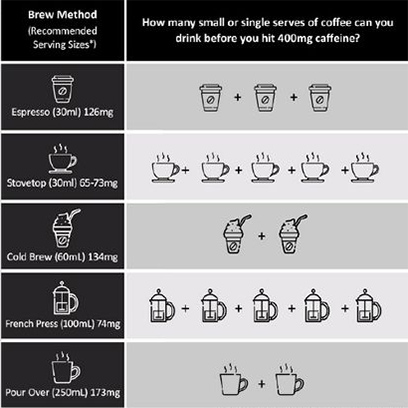How much caffeine does our coffee have?

One of the issues that every coffee lover concerns is the actual caffeine content of his favorite drinks, but also how many coffees he can enjoy in a day. A scientific study from Australia is trying to clear things up.
Everyone who love to enjoy his coffee several times during the day often wonders about the amount of caffeine he consumes daily. While coffee is scientifically proven to have multiple health benefits, the active substance it contains, caffeine, should be consumed with moderation and is contraindicated in case of overconsumption. Doctors recommend that daily caffeine intake should not exceed 400mg, while during pregnancy and breastfeeding that amount decreases by half (and always following the advice of the treating physician). It is worth noting that even in a higher dose, caffeine does not cause poisoning or addiction, as alleged by the raffle, and causes problems only to people with a history of sensitivity to the substance, however, overeating is good to be avoided.
Calculation of caffeine can be particularly difficult, firstly because it is difficult to determine the exact amount contained in each beverage and secondly because, in addition to coffee, caffeine is also included in a number of other foods such as dark chocolate and tea , in smaller doses. Still, many consumers tend to combine the bitter taste of a coffee with the increased presence of caffeine, which is generally not the case: the bitter, "strong" flavor of a coffee is mainly due to the degree of roasting, which has only a negligible effect in caffeine content, while adding sugar and altering the taste of coffee can be even more confusing.
 The University of Newcastle, Australia, undertook a research on behalf of a large Australian coffee chain to clarify the caffeine content of the most popular Australian coffee beverages. Considering the usual serving size of each coffee, Australian researchers have reached the recommended daily consumption per beverage - always calculated for adults without any health problems.
The University of Newcastle, Australia, undertook a research on behalf of a large Australian coffee chain to clarify the caffeine content of the most popular Australian coffee beverages. Considering the usual serving size of each coffee, Australian researchers have reached the recommended daily consumption per beverage - always calculated for adults without any health problems.
A glance at the results of research is enough to understand the crucial importance of extraction for the presence of caffeine in each beverage. An espresso portion is half the size of the usual Cold Brew serving, but the two coffees have almost the same caffeine content, which is almost exclusively due to the extraction method. The same conclusion is reached if we compare the two espresso preparations: the authentic espresso prepared in an espresso machine concerned has almost twice the caffeine content of a corresponding espresso prepared in a "moka" pot. On the contrary, filter coffee has almost the same caffeine as a pour-over coffee, since the extraction process is essentially the same - what differs is the portion’s size.
It is worth noting that the data is adapted to Australian coffee culture and its implementation in Greek reality presents several problems, with the main one being the absence of popular Greek coffee beverages, such as Greek coffee or even instant coffee - frappe. Furthermore, besides extraction, the composition of the blend plays an important role in the total amount of caffeine, as Robusta beans have significantly more caffeine than Arabica beans.
The only thing to be sure is that we can continue to enjoy our coffee without fearing anything. Normal coffee consumption, in addition to being enjoyable, is also beneficial for our body, and absolutely harmless! Like anything good, coffee consumption should have specific limits in order to remain enjoyable.








